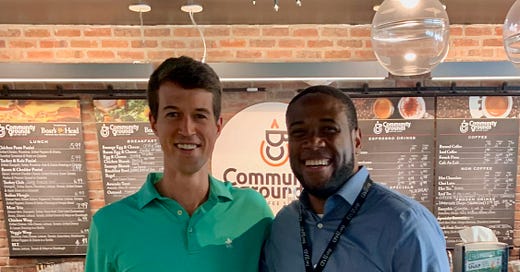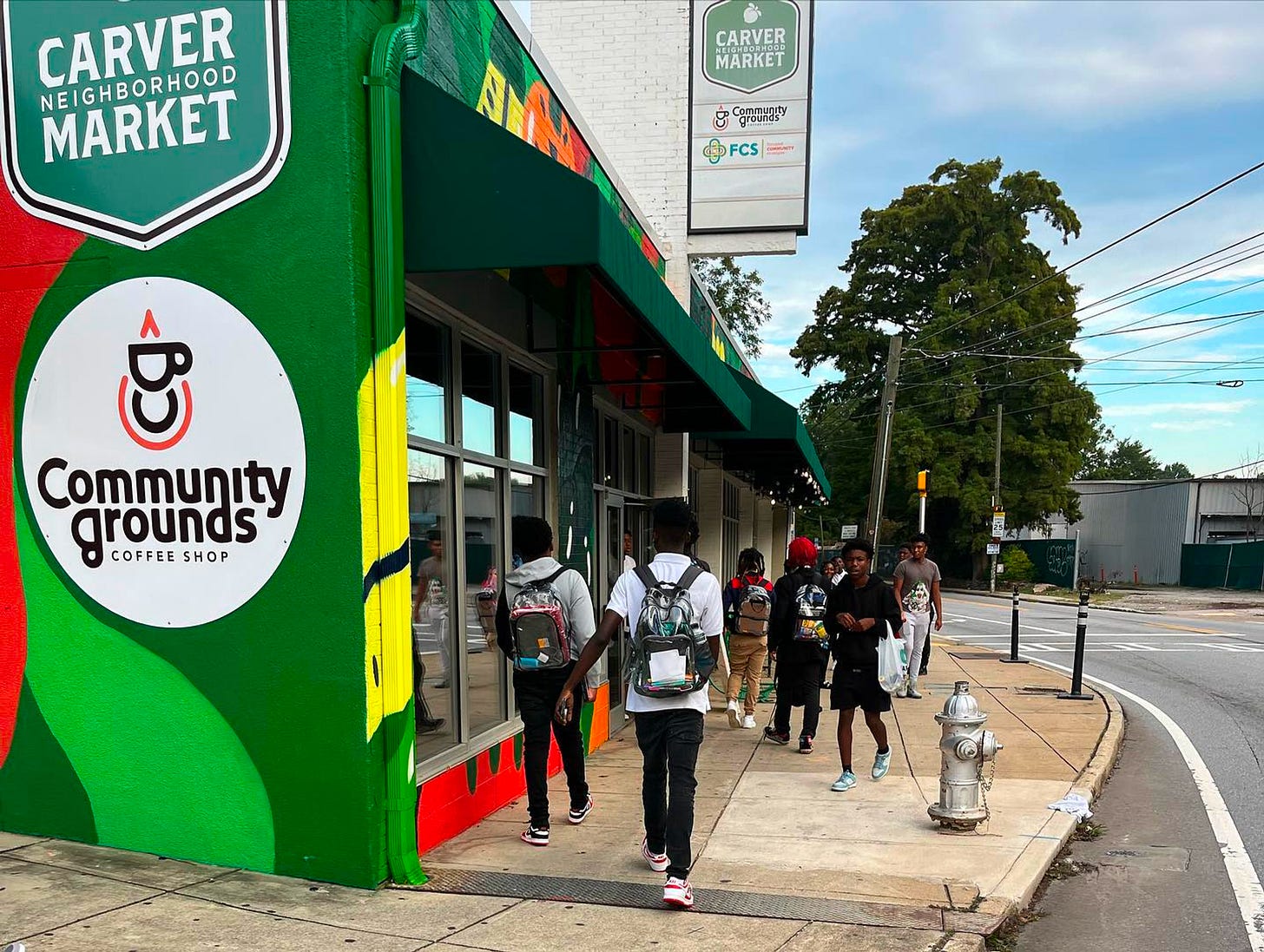Co-Director of Safe & Stable Homes Project at Atlanta Volunteer Lawyers Foundation
Met at Community Grounds on McDonough Blvd in SE Atlanta
As a refresher, I’m grabbing coffee with 100 good people in Atlanta and sharing inspiring takeaways.
Empowering people through safe and stable homes
Pierce took a somewhat circuitous path through the law to his current position at the Atlanta Volunteer Lawyers Foundation (AVLF).
He was a high school teacher with Teach for America before law school, worked as a commercial litigation associate for a renowned Atlanta defense firm, took a big pay cut to serve as a staff attorney at AVLF, switched sides and became a prosecutor at the Fulton County District Attorney’s office, and ultimately re-joined AVLF in an executive role.
The Atlanta Volunteer Lawyers Foundation provides free legal help to low-income tenants and survivors of intimate partner violence. Through the Safe and Stable Homes program, Pierce and his team work primarily on landlord-tenant disputes over evictions, security deposit recovery, and breach of conditions like mold or roach infestations.
With each career move he’s made, Pierce prioritized growth and development, seeking new experiences that would broaden his mastery of the law and promote the “human component” of the work itself. With AVLF, Pierce finds humanity in helping children access education.
Keeping irreplaceable youth in schools
Pierce is Atlanta born and bred. He graduated from Booker T. Washington High School, which opened in 1924 as the first public high school for African-Americans in the state of Georgia. He didn’t know it at the time, but the teacher he was closest with in high school was placed through Teach for America.
Pierce believes education is a unique tool to lift folks out of poverty, and nothing disrupts a child’s educational journey like being displaced from their home. Kids will often be out of school for three months or more following an eviction. The gaps that emerge may never go away.
We also discussed the broader educational issue at play: school viability. In gentrifying Atlanta neighborhoods, affluent children are more likely to attend private schools. If kids from low-income families leave the schools following an eviction, there may not be a backfill - meaning schools are more likely to lose funding and ultimately close.
Embracing impact at the micro level
Of course, the reach of AVLF’s work extends beyond education. Pierce says the need for their work is so overwhelming that Pierce says they are not even scratching the surface. There are around 45,000 evictions annually in Fulton County alone, yet only 1% of tenants have met with an attorney before their initial hearings.
“We are a sinking ship with a gaping hole,” says Pierce of the need for legal services.
Tenants have a 7-day window for filing a response when served an eviction notice. Over half aren’t filed for; tenants simply leave. Pierce says the reason is that they do not know their rights or don’t have access to counsel.
I asked what changes Pierce would make if he could waive his magic legal wand and reshape the landscape. He shared the following hopes:
Providing access to counsel for anyone who can’t afford it before they go to court (the barrier is, of course, government funding - this is already a problem in criminal court, let alone civil).
Revisiting landlord-friendly laws, which limit tenant recourse to suing or moving rather than refusing to pay rent if the landlord doesn’t make crucial repairs (e.g., if your dishwasher floods and your house has standing water, and the landlord does nothing, you can’t stop paying - you either deal with it or move out). On the flipside, a tenant not paying rent is immediate grounds for eviction.
Despite the seemingly endless uphill climb, Pierce finds real joy in the micro-victories he’s able to help land. For families, for children, for the future of their education, and the well-being of his beloved Atlanta.
Reflections & Questions for Discussion
Practically: AI could build capacity for Pierce’s team
Pierce hasn’t used any AI tools in his legal practice, and frankly, it wasn’t really on his radar. This is a promising element of technology - by automating some of the rote tasks that AVLF lawyers execute, new tools might increase their capacity by up to ~30% without a sizable investment, enabling them to assist more families without added cost.
However, it strikes me that the government and NGOs serving lower-income populations are likely to be later adopters to technologies that the private sector is utilizing to get ahead, whether that’s from lack of funding for these tools, overwhelm from casework, or security requirements regarding government data with external vendors. What are practical ways to close that gap?
Spiritually & philosophically: How much do we care?
Pierce and I explored the current and projected reality for the people and neighborhoods he’s serving. In many ways, the alleviation of poverty can be a function of how much government (taxpayer) money we devote to people on the lower end of the economic stratification that capitalism leads to. How much do we actually care about their economic and social mobility, and their day-to-day well-being?
I perceive the competition for public dollar to be heating up dramatically when we think about entitlement reform necessary for an aging population, an unfolding crisis of autism care that we don’t fully comprehend yet, and potential outlays for Universal Basic Income or other increased social safety nets. I don’t foresee more money coming for civil defense.
So is our current ‘bandaid’ on the sinking ship with the gaping hole the best way that this system should work given our competing priorities? Or are there ways we could fix it that would better honor the humanity of all people involved?
About Community Grounds:
Community Grounds is a delightful coffee and sandwich shop owned by Focused Community Strategies (FCS).
FCS is a South Atlanta ministry empowering the Brownsville neighborhood to have equitable transformation through pillars of neighborhood engagement, mixed income housing, economic development, and training and consulting.
Community Grounds is connected to the Carver Neighborhood Market, so residents can get their caffeine buzz, their panini, read some of the books or play a boardgame, and buy staples and fresh groceries.
About 100 Atlanta Coffees:
I decided to publish takeaways from having coffee with 100 Atlantans as a way to shine a light on some of the good souls, and local spots, in our city.
I’ve asked each guest to recommend someone new for me to meet with. Pierce and I connected through Matt Westmoreland who we featured in edition 001. Thanks, Matt!







Love reading these. Thanks for sharing